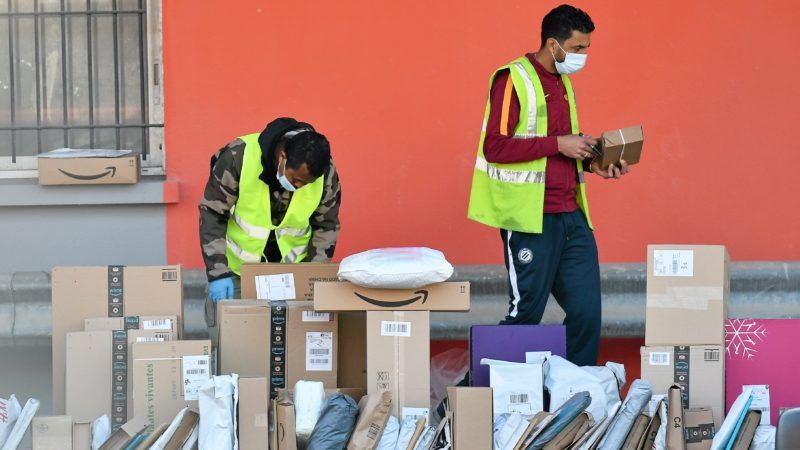No, Rep. Ilhan Omar: Amazon's Decision To Fire Three Workers Isn't a 'National Disgrace'
The congresswoman claimed that Amazon is "refusing to provide basic protective equipment to workers." That's not true.

Amazon has been no stranger to criticism, particularly from left-leaning politicians who scorn the tech behemoth's labor practices. Such critiques are ramping up in the era of COVID-19.
The company fired two of its employees last Friday after they alleged there were unsafe working conditions at Amazon warehouses. Emily Cunningham and Maren Costa—formerly user-experience designers—separately took to Twitter offering to match donations of up to $500 for workers "while they struggle to get consistent, sufficient protections and procedures from our employer," wrote Costa.
The women claim that employees face crowded working conditions with insufficient social distancing practices, that the company is shipping "non-essential goods" despite claiming to have suspended that during the pandemic, that there are insufficient policies on properly disinfecting packaging, and that there are delays in notifying warehouse staff of colleagues' COVID-19 cases.
Both Cunningham and Costa were terminated on April 10, two weeks after drawing attention to these issues. "We support every employee's right to criticize their employer's working conditions, but that does not come with blanket immunity against any and all internal policies," Amazon spokesperson Dan Herdener said in a statement, noting that both women "repeatedly" breached such rules.
Another Amazon employee, Bashir Mohamed, was fired last week after he internally protested against the company's coronavirus-related procedures, though Amazon said his dismissal came as a "result of progressive disciplinary action for inappropriate language, behavior, and violating social distancing guidelines."
"This should be a national scandal," Rep. Ilhan Omar (D–Minn.) tweeted. Sen. Bernie Sanders (I–Vt.), long a critic of Amazon, echoed Omar's sentiments, calling the terminations "obscene."
So what will this mean for the tech colossus, which is pulling a great deal of economic weight amid the COVID-19 shutdowns?
If history serves as any indication, Amazon could soon find itself surrounded by a renewed push for regulation. In September 2018, for example, Sanders unveiled the Stop BEZOS Act (referencing the company's founder, Jeff Bezos) which sought to tax companies that Sanders alleged had underpaid their employees. Presumptive Democratic presidential nominee Joe Biden singled out the company's tax bill last year, arguing that such a mammoth business should pay more of their fair share. The list goes on.
Amazon's ability to deliver goods far and wide has been a godsend during shelter-in-place orders, allowing the quarantined masses to receive essential goods without ever leaving their homes. Just three days ago, executives announced they were creating an additional 75,000 jobs on top of the 100,000 positions that were added over the last four weeks—all in a clobbered economy, where most businesses are more likely to be laying off staff in droves rather than onboarding them.
But the complaints from both women are bound to raise concerns. Cunningham's March 27 tweets include a video of warehouse workers in Poland exiting the building in alarmingly close quarters, as well as a citation that she says reprimands an employee for taking a two-minute hand-washing break. She quotes a delivery driver who says workers were without proper protective equipment and notes a social-distancing sign in a warehouse that incorrectly calls for three feet of distance as opposed to the current recommendation of six feet.
The company contends it has since made some changes. "We have taken extreme measures to keep people safe, tripling down on cleaning and sanitation, procuring safety supplies such as masks for employees, implementing temperature checks at our facilities, and ensuring all employees are adhering to safe distances in our buildings," Amazon said. The procedural fixes were announced in an April 2 blog post by Dave Clark, the company's senior vice president for worldwide operations. Incorrect, then, is Omar's April 14 tweet, where she claimed that "Amazon is retaliating against union organizers *and* refusing to provide basic protective equipment to workers."
One Amazon employee has died from complications related to COVID-19, which drew the company a barrage of intensified media scrutiny. The man, who succumbed to the disease on March 31, started experiencing symptoms after traveling on vacation to Mexico from March 7-20; management claims he did not return to the warehouse after his trip, which means he probably couldn't have contracted the virus on the job.
Whether Amazon has taken the appropriate steps to maximally protect workers is hard to discern. Though Cunningham's tweets, if true, indicate some working conditions were unsafe, it's also possible they have since improved with the promised adjustments. What's more, it seems that both Cunningham and Costa may have had ulterior motives that partially drove the public airing of their complaints: "We want to tell Amazon that we are sick of all this—sick of the firings, sick of the silencing, sick of pollution, sick of racism, and sick of the climate crisis," Costa said during an appearance on yesterday's panel with Amazon Employees for Climate Justice, of which Cunningham was also a member.
Even so, left-leaning politicians didn't need another excuse to zero in on the company, yet now they have one. Notwithstanding the negative publicity, Amazon has largely dodged major regulations in the Trump era. For a business that has recently upgraded itself from a luxury to a potentially life-saving resource—one that has made social distancing possible (and much easier) for many people during a pandemic—consumers should hope it doesn't squander that image by maintaining questionable warehouse working conditions. After all, if Amazon doesn't independently address these problems, then politicians will likely do it for them.


Show Comments (50)